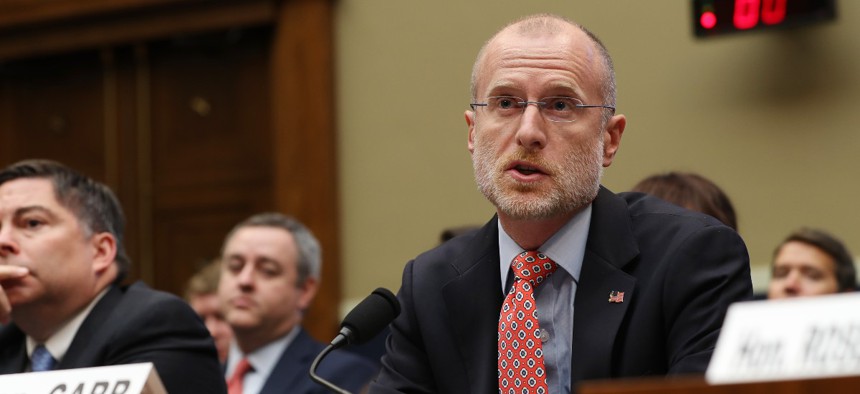TikTok Should be Banned in the U.S., FCC Commissioner Says

Federal Communication Commission Commissioner Brendan Carr testifies before the House Energy and Commerce Committee's Communications and Technology Subcommittee in the Rayburn House Office Building on Capitol Hill December 05, 2019 in Washington, DC. Chip Somodevilla/Getty Images
The commissioner’s comments are the latest in a long line of concerns about the social media platform’s Chinese ties.
Federal Communications Commissioner Brendan Carr called for the U.S. to entirely ban the social media app TikTok over concerns about how the app and its Beijing-based parent company, ByteDance, handle U.S. user data.
“I don’t believe there is a path forward for anything other than a ban,” Carr said in an interview with Axios.
Carr’s remarks come as the Council on Foreign Investment in the U.S. is in the midst of negotiations with TikTok about whether it can continue to operate in the U.S. if ByteDance sells the app to an American company. While the FCC has no authority to directly regulate TikTok, Carr urged CFIUS to implement the ban.
The popular social media app—which has more than 200 million downloads in the United States alone—has drawn widespread concern for its potential threat to national security, due to its ownership by a Chinese company. As Carr pointed out in June 2022, ByteDance is “beholden to the Communist Party of China and required by Chinese law to comply with the PRC’s surveillance demands.” He noted that data collected from TikTok was accessed by ByteDance officials in Beijing, as reported by Buzzfeed earlier that month.
TikTok reached a $92 million class-action settlement in 2021 over lawsuits that it transferred American user data, including personally identifiable information, to China.
“It is clear that TikTok poses an unacceptable national security risk due to its extensive data harvesting being combined with Beijing’s apparently unchecked access to that sensitive data,” Carr wrote in a June letter to Google and Apple, asking the companies to remove TikTok from their app stores.
“It is not just an app for sharing funny videos or memes. That’s the sheep’s clothing,” he wrote. “At its core, TikTok functions as a sophisticated surveillance tool that harvests extensive amounts of personal and sensitive data.”
On Tuesday, Carr told Axios there is not “a world in which you could come up with sufficient protection on the data that you could have sufficient confidence that it’s not finding its way back into the hands of the [Chinese Communist Party].”
This is not the first time a government official or government agencies have expressed concerns about the social media app.
The Transportation Security Agency banned employees from using TikTok in early 2020, citing national security concerns. Several U.S. military branches, including the Navy, Army, Air Force, Coast Guard and Marine Corps, have also banned TikTok from government-issued devices, alongside a Department of Defense-wide ban and prohibition of its use on Department of Homeland Security devices.
Attempts to ban TikTok on all government-issued devices through legislation like the No TikTok on Government Devices Act—which was introduced in March 2020 by Sen. Josh Hawley, R-Mo., and reintroduced in 2021— have failed to become law.
Nextgov contacted other agencies about their TikTok policies, but did not hear back in time for publication.
A TikTok spokesperson told Nextgov, “Commissioner Carr has no role in the confidential discussions with the U.S. government related to TikTok and appears to be expressing views independent of his role as an FCC commissioner.”
In regards to the CFIUS negotiations, the TikTok spokesperson added, “We are confident that we are on a path to reaching an agreement with the U.S. government that will satisfy all reasonable national security concerns.”
Nextgov also contacted the FCC about Carr’s comments, but did not hear back in time for publication.






